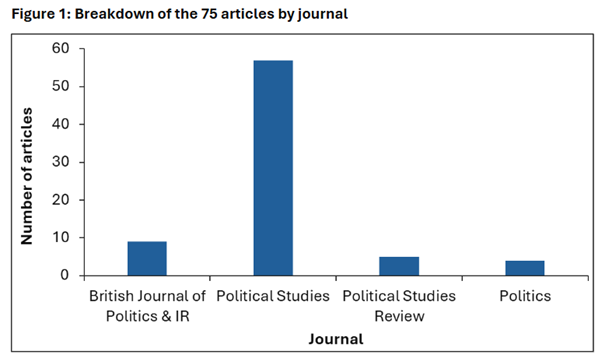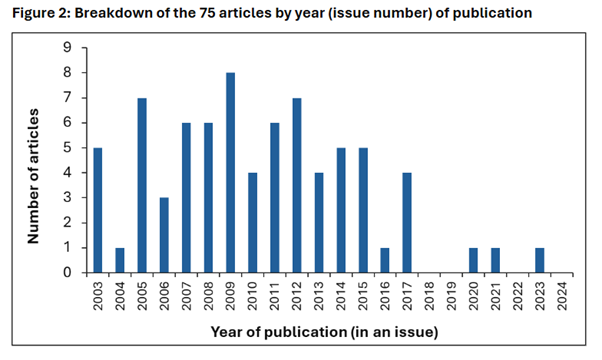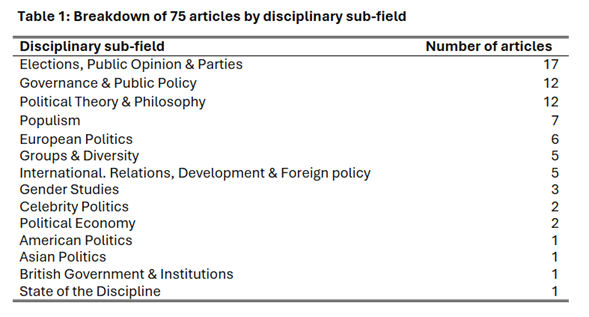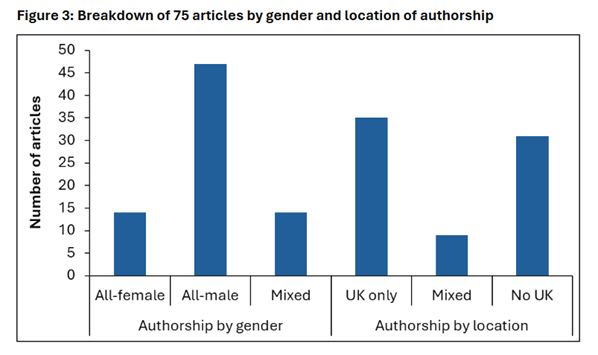You are here
From ‘Democracy and Legitimacy’ to ‘The Contested Council’: An analysis of the 75 most-cited PSA articles
To mark the Political Studies Association’s (PSA) 75th anniversary, we identified the 75 most-cited articles—between 1 January 2003 and 1 August 2025 using Web of Science Core Citations—across our suite of journals. There is obviously far more to academic publishing than citations, which can never fully capture articles’ significance and impact. But the number of citations can help us track an article’s influence—and whose work has been influential.
The PSA currently publishes four peer-reviewed journals: Political Studies (first published in 1953), Politics (1981), the British Journal of Politics and International Relations (1999), and Political Studies Review (2003). These journals are of huge importance to the PSA and are highly regarded across the discipline. They underpin our strategic goals by enabling us to promote and disseminate excellence in research and teaching across the wider political studies community —and, through our publication agreement with Sage, provide us with much-needed revenue that supports all our endeavours.
The big picture
Our analysis of citation scores covers all articles that have been published since the launch of our fourth journal, Political Studies Review, in 2003. Across the 75-most cited articles, the total number of citations ranged from 834 for Viven Schmidt’s ‘Democracy and Legitimacy in the European Union Revisited: Input, Output and “Throughput”’, to 123 cites for Christina Zimmer, Gerald Schneider and Michael Dobbins’s ‘The contested Council: Conflict dimensions of an intergovernmental EU institution’.
Figure1 shows how the 75 articles were distributed across our journals. The overwhelming majority (57) were published in Political Studies, which is consistent with its status as the PSA’s oldest, flagship journal. Nine of the articles were published in the British Journal of Politics and International Relations, five in Political Studies Review, and four in Politics.

Not surprisingly, most of the 75 articles were published towards the beginning of our period, as shown in Figure 2. They have been to accumulate more citations. Over time, more recently published articles may well surpass them.

Areas of inquiry
What have the most-cited articles tended to focus on? To answer this question, we sought to categorise each article by its disciplinary sub-field. We did so by following and adapting the categories used by Matthew Flinders (2024) in his recent analysis of articles published in the British Journal of Politics and International Relations. In addition to his categories, we added ‘Populism’, ‘Groups & Diversity’, ‘Celebrity Politics’ and ‘Asian Politics’.
Categorising articles by disciplinary sub-field is problematic for all the reason Flinders identifies. Disciplinary boundaries are fluid, and others may disagree with coding decisions. The results should be handled with caution.
Accepting these limitations, the three most prevalent sub-disciplines were ‘Elections, Public Opinion & Parties’, ‘Governance & Public Policy’ and ‘Political Theory & Philosophy’ (see Table 1). Reflecting real-world developments, ‘Populism’ also featured heavily in the 75 most-cited articles.

One intriguing finding was the relatively small number of case-oriented articles on British politics. The UK featured in over a dozen articles across all sub-fields, but usually in the context of wider, comparative debates. The PSA’s journals are sometimes perceived as being UK focused, but their most-cited articles clearly speak to global debates and challenges.
Who was cited?
When it comes to authorship, the most prominent scholars in our 75 most-cited articles were Pippa Norris and Christoffer Green-Pedersen. Three of their articles appeared in the list.
We also looked at authors’ gender and whether they were UK-based. To code gender, we sought to ascertain the pronouns publicly used by all the authors associated with every article. We then coded each article based on whether the authorship was all-female (regardless of how many authors were credited), all-male or mixed. This last category applied only to co-authored work. For geographic location, we used the institutional addresses associated with all authors at the time of an article’s publication. We coded each article based on whether the authors were all located in the UK, some were UK-based, or none. In this instance, the middle category applied only to co-authored work.
Figure 3 shows the gender and geographic profile of authorship across the 75 articles. A large majority of the articles were authored or co-authored exclusively by men (47). Less than one-fifth of the articles (14) were authored or co-authored exclusively by women. These findings chime with the well-established over-representation of men across the discipline.
Meanwhile, just under half of the 75 articles were authored or co-authored exclusively by UK-based scholars (35), but a comparable number were authored or co-authored exclusively by non-UK-based scholars (31)—and the remainder were written by teams with at least one non-UK author. These findings highlight the international reach of the PSA’s journals and their global appeal as outlets of original research.

The next 75 years
Publishing has always been one of the PSA’s core activities. Our suite of journals has grown and evolved over recent decades—and it will almost certainly grow and evolve in the future. Our list of most-cited articles—which are available below—obviously reflects the traditions and reputations of our journals, but they also reflect recent disciplinary trends. In this respect, our journals will continue to champion diversity and inclusion—and promote excellence in research and scholarship.
The success of any journal ultimately rests on the labour of authors—and especially editors. Editing a journal is hard work. It’s only right to conclude by expressing the PSA’s enormous thanks to all our editorial teams, past and present, for their amazing efforts over the last 75 years.
You can find out more about our PSA journals here.
* The 75 most-cited articles, 1 January 2003 – 1 August 2025
-
Schmidt, Vivien A. (2013) Democracy and Legitimacy in the European Union Revisited: Input, Output and ‘Throughput’. Political Studies
-
Dalton, Russell J. (2008) Citizenship norms and the expansion of political participation. Political Studies
-
Moffitt, Benjamin; Tormey, Simon (2014) Rethinking Populism: Politics, Mediatisation and Political Style. Political Studies
-
Crouch, Colin (2009) Privatised Keynesianism: An Unacknowledged Policy Regime. British Journal of Politics & International Relations
-
Stolle, Dietlind, Soroka, Stuart; Johnston, Richard (2008) When does diversity erode trust? Neighborhood diversity, interpersonal trust and the mediating effect of social interactions. Political Studies
-
Aslanidis, Paris (2016) Is Populism an Ideology? A Refutation and a New Perspective. Political Studies
-
Jordan, A; Wurzel, RKW; Zito, A (2005) The rise of 'new' policy instruments in comparative perspective: Has governance eclipsed government? Political Studies
-
Abts, Koen; Rummens, Stefan (2007) Populism versus democracy. Political Studies
-
Letki, Natalia (2008) Does diversity erode social cohesion? Social capital and race in British neighbourhoods. Political Studies
-
Bale, Tim; Green-Pedersen, Christoffer; Krouwel, Andre; Luther, Kurt Richard; Sitter, Nick (2010) If You Can't Beat Them, Join Them? Explaining Social Democratic Responses to the Challenge from the Populist Radical Right in Western Europe. Political Studies
-
Devine, Daniel; Gaskell, Jennifer; Jennings, Will; Stoker, Gerry (2021) Trust and the Coronavirus Pandemic: What are the Consequences of and for Trust? An Early Review of the Literature. Political Studies Review
-
Goodwin, Matthew; Milazzo, Caitlin (2017) Taking back control? Investigating the role of immigration in the 2016 vote for Brexit. British Journal of Politics & International Relations
-
Benson, David; Jordan, Andrew (2011) What Have We Learned from Policy Transfer Research? Dolowitz and Marsh Revisited. Political Studies Review
-
Marien, Sofie; Hooghe, Marc; Quintelier, Ellen (2010) Inequalities in Non-institutionalised Forms of Political Participation: A Multi-level Analysis of 25 countries. Political Studies
-
Dunlop, Claire A.; Radaelli, Claudio M. (2013) Systematising Policy Learning: From Monolith to Dimensions. Political Studies
-
Green-Pedersen, Christoffer (2007) The growing importance of issue competition: The changing nature of party competition in Western Europe. Political Studies
-
Heath-Kelly, Charlotte (2013) Counter-Terrorism and the Counterfactual: Producing the 'Radicalisation' Discourse and the UK PREVENT Strategy. British Journal of Politics & International Relations
-
Childs, Sarah; Krook, Mona Lena (2008) Critical mass theory and women's political representation. Political Studies
-
McCann, Eugene; Ward, Kevin (2012) Policy Assemblages, Mobilities and Mutations: Toward a Multidisciplinary Conversation. Political Studies Review
-
Citrin, Jack; Sides, John (2008) Immigration and the imagined community in Europe and the United States. Political Studies
-
Ball, Stephen J. (2008) New Philanthropy, New Networks and New Governance in Education. Political Studies
-
Gilabert, Pablo; Lawford-Smith, Holly (2012) Political Feasibility: A Conceptual Exploration. Political Studies
-
Blais, Andre; Gelineau, Francois (2007) Winning, losing and satisfaction with democracy. Political Studies
-
Parkinson, J (2003) Legitimacy problems in deliberative democracy. Political Studies
-
Lovenduski, J; Norris, P (2003) Westminster women: The politics of presence. Political Studies
-
McLaren, Lauren; Johnson, Mark (2007) Resources, group conflict and symbols: Explaining anti-immigration hostility in Britain. Political Studies
-
Binderkrantz, A (2005) Interest group strategies: Navigating between privileged access and strategies of pressure. Political Studies
-
Hendriks, Carolyn M. (2006) Integrated deliberation: Reconciling civil society's dual role in deliberative democracy. Political Studies
-
Grayson, Kyle; Davies, Matt; Philpott, Simon (2009) Pop Goes IR? Researching the Popular Culture-World Politics Continuum. Politics
-
Wilkinson, T. M. (2013) Nudging and Manipulation. Political Studies
-
Andersson, Staffan; Heywood, Paul M. (2009) The Politics of Perception: Use and Abuse of Transparency International's Approach to Measuring Corruption. Political Studies
-
Colomer, JM (2005) It's parties that choose electoral systems (or, Duverger's laws upside down). Political Studies
-
Cairney, Paul (2012) Complexity Theory in Political Science and Public Policy. Political Studies Review
-
Pratchett, L (2004) Local autonomy, local democracy and the 'new localism'. Political Studies
-
Green, Jane (2007) When voters and parties agree: Valence issues and party competition. Political Studies
-
Meer, Nasar; Modood, Tariq (2009) The Multicultural State We're In: Muslims, 'Multiculture' and the 'Civic Re-balancing' of British Multiculturalism. Political Studies
-
Grix, Jonathan; Houlihan, Barrie (2014) Sports Mega-Events as Part of a Nation's Soft Power Strategy: The Cases of Germany (2006) and the UK (2012). British Journal of Politics & International Relations
-
Pattie, C; Seyd, P; Whiteley, P (2003) Citizenship and civic engagement: Attitudes and behaviour in Britain. Political Studies
-
Sanderson, Ian (2009) Intelligent Policy Making for a Complex World: Pragmatism, Evidence and Learning. Political Studies
-
van der Heijden, Jeroen (2011) Institutional Layering: A Review of the Use of the Concept. Politics
-
Farrelly, Colin (2007) Justice in ideal theory: A refutation. Political Studies
-
van der Meer, Tom; Hakhverdian, Armen (2017) Political Trust as the Evaluation of Process and Performance: A Cross-National Study of 42 European Countries. Political Studies
-
Finlayson, Alan (2009) Financialisation, Financial Literacy and Asset-Based Welfare. British Journal of Politics & International Relations
-
Campbell, Rosie; Cowley, Philip (2014) What Voters Want: Reactions to Candidate Characteristics in a Survey Experiment. Political Studies
-
Norris, Pippa; Inglehart, Ronald F. (2012) Muslim Integration into Western Cultures: Between Origins and Destinations. Political Studies
-
Hobolt, SB; Klemmensen, R (2005) Responsive government? Public opinion and government policy preferences in Britain and Denmark. Political Studies
-
Mitchell, Paul; Evans, Geoffrey; O'Leary, Brendan (2009) Extremist Outbidding in Ethnic Party Systems is Not Inevitable: Tribune Parties in Northern Ireland. Political Studies
-
Yablokov, Ilya (2015) Conspiracy Theories as a Russian Public Diplomacy Tool: The Case of Russia Today (RT). Politics
-
Rooduijn, Matthijs (2014) The Mesmerising Message: The Diffusion of Populism in Public Debates in Western European Media. Political Studies
-
Miller, David (2012) Territorial Rights: Concept and Justification. Political Studies
-
March, Luke (2017) Left and right populism compared: The British case. British Journal of Politics & International Relations
-
Boswell, Christina; Geddes, Andrew; Scholten, Peter (2011) The Role of Narratives in Migration Policy-Making: A Research Framework. British Journal of Politics & International Relations
-
Henn, M; Weinstein, M; Forrest, S (2005) Uninterested youth? Young people's attitudes towards party politics in Britain. Political Studies
-
Nasstrom, Sofia (2011) The Challenge of the All-Affected Principle. Political Studies
-
Ford, Robert; Goodwin, Matthew J. (2010) Angry White Men: Individual and Contextual Predictors of Support for the British National Party. Political Studies
-
Geurkink, Bram; Zaslove, Andrej; Sluiter, Roderick; Jacobs, Kristof (2020) Populist Attitudes, Political Trust, and External Political Efficacy: Old Wine in New Bottles? Political Studies
-
Green-Pedersen, Christoffer (2012) A Giant Fast Asleep? Party Incentives and the Politicisation of European Integration. Political Studies
-
Kennedy, John James (2009) Maintaining Popular Support for the Chinese Communist Party: The Influence of Education and the State-Controlled Media. Political Studies
-
Marinetto, M (2003) Governing beyond the centre: A critique of the Anglo-governance school. Political Studies
-
Levi, Margaret; Murphy, Gillian H. (2006) Coalitions of contention: The case of the WTO protests in Seattle. Political Studies
-
Blinder, Scott (2015) Imagined Immigration: The Impact of Different Meanings of 'Immigrants' in Public Opinion and Policy Debates in Britain. Political Studies
-
Coole, D (2005) Rethinking agency: A phenomenological approach to embodiment and agentic capacities. Political Studies
-
Anderson, Ben (2015) What Kind of Thing is Resilience? Politics
-
Dobson, A (2006) Thick cosmopolitanism. Political Studies
-
Ramiro, Luis; Gomez, Raul (2017) Radical-Left Populism during the Great Recession: Podemos and Its Competition with the Established Radical Left. Political Studies
-
Goodin, RE; Niemeyer, SJ (2003) When does deliberation begin? Internal reflection versus public discussion in deliberative democracy. Political Studies
-
Marsh, David; 't Hart, Paul; Tindall, Karen (2010) Celebrity Politics: The Politics of the Late Modernity? Political Studies Review
-
Durose, Catherine (2011) Revisiting Lipsky: Front-Line Work in UK Local Governance. Political Studies
-
Norris, Pippa (2023) Cancel Culture: Myth or Reality? Political Studies
-
Schmidt, Vivien A. (2014) Speaking to the Markets or to the People? A Discursive Institutionalist Analysis of the EU's Sovereign Debt Crisis. British Journal of Politics & International Relations
-
Rushton, Simon (2011) Global Health Security: Security for Whom? Security from What? Political Studies
-
Dahlberg, Stefan; Linde, Jonas; Holmberg, Soren (2015) Democratic Discontent in Old and New Democracies: Assessing the Importance of Democratic Input and Governmental Output. Political Studies
-
Street, John (2012) Do Celebrity Politics and Celebrity Politicians Matter? British Journal of Politics & International Relations
-
White, Jonathan (2015) Emergency Europe. Political Studies
-
Zimmer, C; Schneider, G; Dobbins, M (2005) The contested Council: Conflict dimensions of an intergovernmental EU institution. Political Studies
